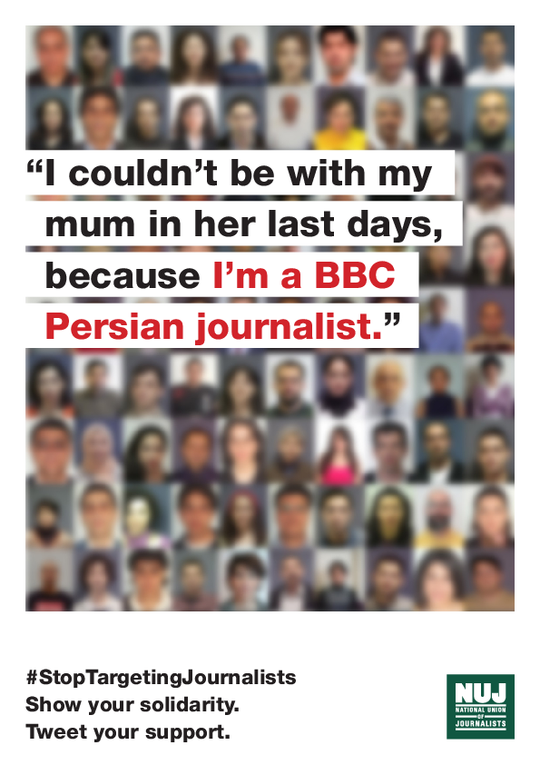
- FIJ
- Salle de presse
- Dernières infos
- Iran: IFJ calls for dropping of charges against BBC journalists
Iran: IFJ calls for dropping of charges against BBC journalists
The IFJ has backed calls for the Iranian government to drop criminal charges against dozens of journalists working for the BBC’s Persian language service in London.
Members of IFJ affiliate the National Union of Journalists have been charged with conspiracy against Iran’s national security. The move follows a ban on 152 named individuals buying or selling property inside Iran, effectively freezing their assets.
Since the BBC’s Persian TV started broadcasting into Iran in 2009, Iranian staff have been subjected to an onslaught of harassment and persecution.
NUJ General Secretary Michelle Stanistreet said: "These ludicrous charges amount to the collective punishment of journalists and a crass attempt to intimidate. In practice the journalists affected cannot defend themselves unless they travel to Iran and of course, if they do, the likelihood is they will end up in jail. Dozens of family members and friends of BBC Persian Service journalists have been interrogated by intelligence agencies, threatened and urged to pressure their relatives to leave their jobs in London or agree to spy on their colleagues.
"In July this year Tehran’s judicial authorities issued a court order preventing current and former BBC journalists and contributors from conducting financial transactions or selling properties in their home country.
IFJ General Secretary Anthony Bellanger said: “The continuing persecution must stop - Iran should drop the criminal charges and lift the asset ban immediately. We stand in solidarity with the NUJ and its members."
Since the BBC’s Persian TV started broadcasting into Iran in 2009, Iranian staff have been subjected to an onslaught of harassment and persecution. In one case, the elderly mother of one of the journalists was questioned at night by five men in balaclavas, while she was forced to face the wall. The interrogators warned her that her son’s life was at risk because there were many fatal car crashes in London.
In another case, a six-year old girl was called in for questioning regarding her sister working in the BBC. Families members have been arrested; the sister of a TV presenter was kept in Iran’s notorious Evin Jail to blackmail her to leave her BBC job. When that didn’t work, the presenter in London was asked by her sister’s interrogator to work as a spy for the Iranian government.
Some BBC Persian Service employees who have travelled to Iran to visit their parents have been persuaded by the intelligence agencies to stop working for the BBC – one after spending some months in jail. Another journalist who went to Iran has been barred from leaving the country.
BBC Persian Service journalists no longer feel safe to travel to Iran with the result that many have been unable to visit dying parents, or attend their funerals. Some parents have had their passports taken away from them, making it impossible for them to visit their sons or daughters or see their grandchildren abroad. Others have lost their jobs.
The IFJ is mobilising global solidarity for the journalists and calling on the international community for their full support in halting this unprecedented attack.
The hashtag for the campaign is #StopTargetingJournalists
